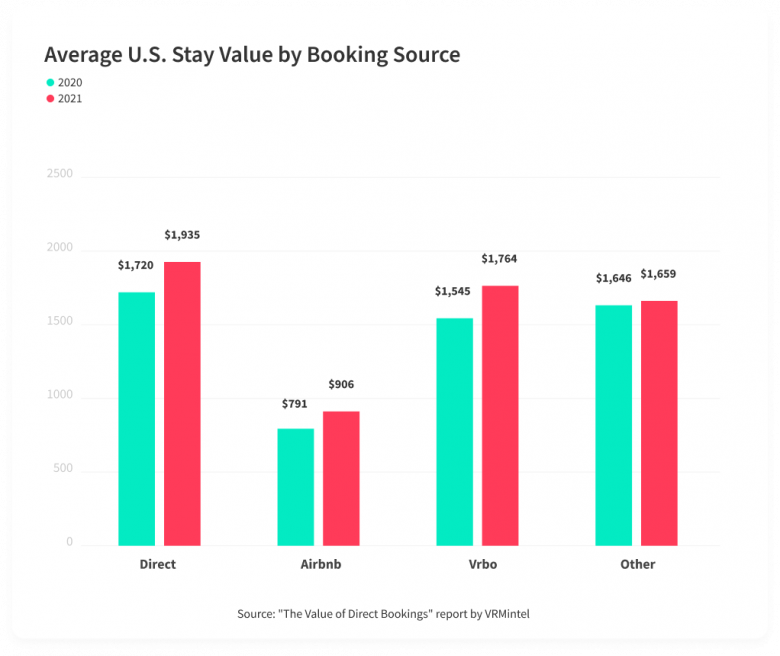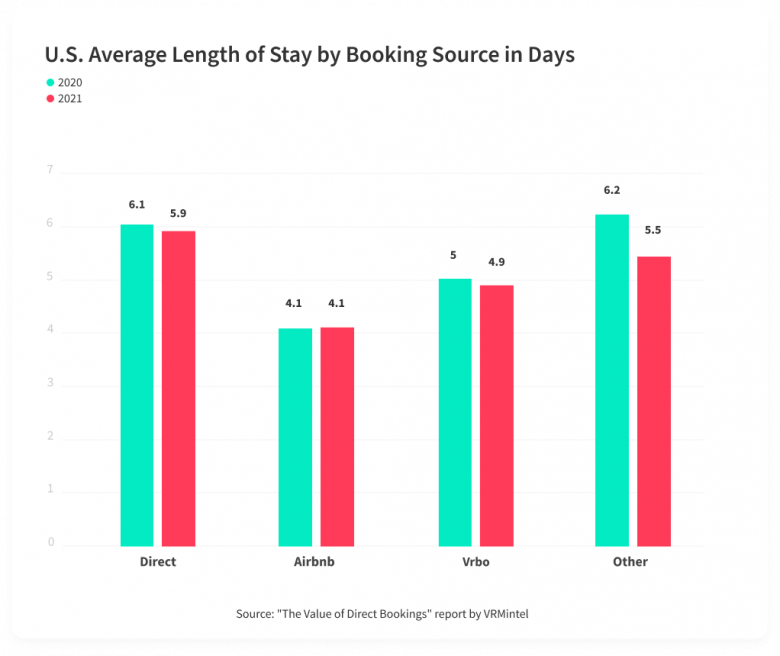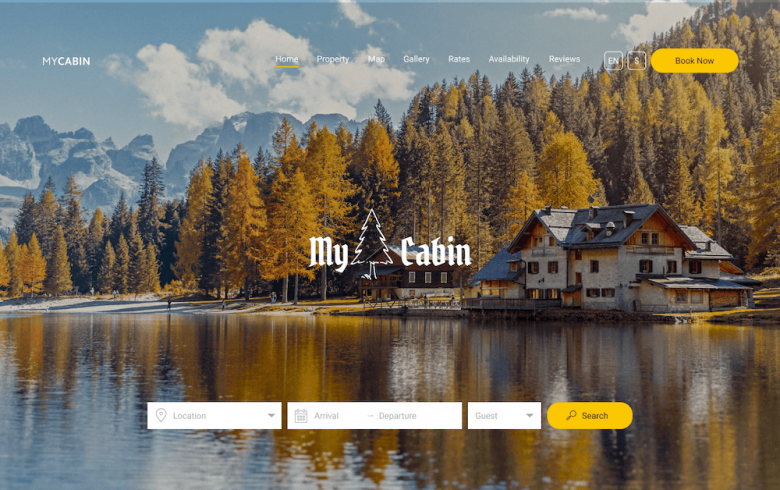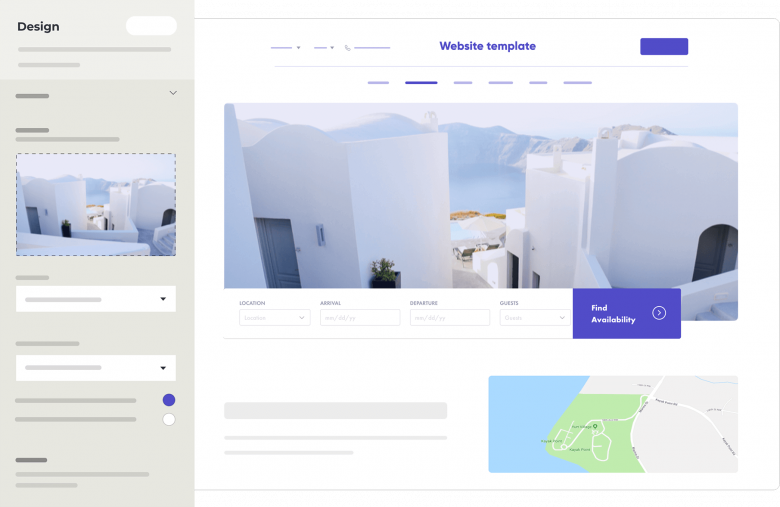Ultimate Guide to Increasing Vacation Rental Direct Bookings
Last Updated March 2024
Direct bookings can feel like a bit of a pipedream when you’re just starting with your vacation rental business. For most owners in the field, their direct booking website will be their first time making a webpage. It’s hard enough to build a site that’s attractive to guests and conveys all the necessary information, but it’s a whole other set of challenges to get guests there in the first place.
As the saying goes, where there’s a will (and a stellar direct booking website builder), there’s a way! The good news is that it’s not impossible to get more direct bookings for your short-term rental—you’ve just got to learn how, and we’re here to help. This comprehensive guide will walk you through what it means to create and manage a direct booking website, the advantages, and the precise steps to follow to build your vacation rental direct booking portfolio.
What is a direct booking website?
Let’s start with the basics because new vacation rental owners might be slightly confused about what exactly goes into a direct booking website (which is fair!).
When starting any business, many people will tell you, “You need a website.” While that’s true in many cases (especially as a vacation rental business owner), you’re probably wondering what the uses of a direct booking website are if your product is a vacation rental, right?
A direct booking website is a space to show property photos, a listing description, and a booking engine for guests to make reservations. More specifically, a short-term rental direct booking website is your digital space to introduce guests to your property, convince them to make a booking, and safely secure their reservation without the help of a third-party listing site.
Great! Now, how do you build a direct booking website? Luckily, these days, you don’t need to hire a website developer or learn how to code.
With the right website builder, you’ll have easily editable and customizable tabs to organize information however you want. Here’s some standard information found on direct booking websites:
- Photo gallery
- How to get there/directions
- What to do/attractions guide
- Testimonials/reviews
- Deals and discounts
- “About us” or a bio page
- Blog
- And, of course, a “Book with Us” tab or search box widget
These are just some examples of what you could add to your direct booking website, but remember that it’s ultimately up to you. Consider your target audience and what they’re looking for when visiting a vacation rental website. Use those insights to decide what to include on your direct booking site to increase engagement and conversions.
💡 Tip: Don’t just have your booking option published in one place on your website. Having a “Book now” button at the top right corner and embedding the search box on other pages will give guests more places to book with ease.
Why vacation rental owners need their own direct bookings website
We’re not going to lie: building an excellent direct booking website isn’t a five-minute task. You can have a great website in under a couple of hours, but you’ll still need to dedicate the time to do so. So the question we usually get after ‘what is a direct booking website’ is…what are the benefits of having a direct booking website if you still have to build it yourself?
There are quite a few! Ultimately, the advantages far outweigh the initial effort and costs.
To ensure you understand the importance of having your own short-term rental direct booking website, we’ve explained the top benefits below, but the options truly are endless when you have ownership over your reservations.
More value
One of the main benefits of direct bookings is the value that they add to your business and bottom line. The worth of a reservation is significantly greater when you compare direct bookings with OTA bookings.
Take the example of direct bookings versus the Airbnb equivalent. These bookings are equal except for the source, yet the value is highly different.

According to “The Value of Direct Bookings” report by VRMintel, the average worth of a booking from Airbnb based on recent figures is around $906 per reservation. Compare that statistic to that of direct bookings valued at $1,935, and you’ll see a whopping $1,029 difference. A direct booking, in this case, is worth over double that of Airbnb, according to these figures.
H2c’s 2023 Digital Hotel Operations Study highlighted the importance of ancillary revenue via upsells for property managers, hotels, and vacation rental business owners who accept bookings on a direct booking website, too. When asked, respondents believed that ancillary revenue could nearly double from 15% to 29% by offering relevant upsells during the booking or pre-check-in phases. This isn’t an opportunity you have when accepting bookings on third-party platforms.
Save on commissions
You’ve done the work, spruced up your vacation rental, staged your property to pristine quality, and put in a couple of hours of administrative tasks, only to find out that your payout is way lower than you intended. You might be scratching your head if your average daily rate was $100, but you’ve only been paid $74.
That’s one of the biggest drawbacks of listing on an OTA, and it’s one of the main reasons why many hosts question how lucrative direct booking vs. Airbnb hosting can be (or even direct booking vs. Vrbo or any other vacation rental listing site).
After all, every listing site has some fee or surcharge that needs to be paid—it’s what keeps the sites running.
These fees are how these sites fund customer support, marketing efforts, and resources for hosts and guests. In other words, they’re actively paying more to list their vacation rental property, which, booked directly, would not cost as much. Each listing site has its own fee structure, which you can find in our vacation rental websites guide (don’t worry—it’s been updated to reflect the current state of the vacation rental website market in 2024).
Although OTAs give you a lot of exposure and can boost bookings, having your own direct booking website eliminates those extra expenses. With a direct booking site, you can take advantage of the funds you save on OTA commissions and invest that budget into other revenue-boosting efforts like providing breakfast at your property or preparing a welcome pack for your guests.
These small details will help you to generate loyal guests and obtain more positive reviews, which in turn will motivate other guests to book on your website!
A longer length of stay
It’s not all about money when calculating the worth of a direct booking. Yes, you’ll be earning more and spending less on OTA fees, but what about the time invested in your bookings? Direct bookings also provide a greater value when saving you time and effort.
Any seasoned host will tell you that the more guest turnover you have, the more work that needs to be done. If you’re managing check-ins and check-outs yourself, you know that you have to block out at least half a day’s worth of your time to clean and prep for the next guest. Even if you’re using integrations to help you automate and optimize guest management and cleaning tasks, it’s still a lot of work.
To eliminate the hassle and save time, hosts generally try to target travelers who book longer stays. Long stays mean less disruption in reservation flow and also help minimize vacancies, saving you money and significant chunks of time.
There are many ways to promote long-term stays, but having the option to book directly tends to attract a longer length of stay just by the nature of these reservations. Let the numbers speak for themselves!

The length of stay from a direct booking in 2021 averaged around 5.9 days, while Airbnb and Vrbo’s average ranged around four and a half days. This means you’d gain a whole extra day minimum by booking your guests directly.
Let’s put that into the perspective of profit.
Let’s say you have around four bookings a month valued at $100 per night. Those bookings will net you around $1,800 a month before OTA fees. Now, if you have four direct bookings valued at the same price, you could make $2,360 simply from a day’s increase in each booking. That would be a $560 monthly increase just by hosting your guests a bit longer, thanks to direct bookings.
Control over your own property
Every third-party vacation rental listing site has its own set of rules and standards that they expect you, as a host, to follow. Keeping the guidelines consistent helps to set expectations for guests.
If you book through Airbnb, for instance, you know more or less what to expect—be it vacation rental insurance or house rules. These guidelines might help guests get a feel for the property, but they can be very limiting for the host.
You’ve decided to list your property, so you should be able to manage it in full, too. When you acquire guests through your own direct booking website, you have a say over the entire reservation, from start to finish. How you handle check-ins, reservation requests, and payments will be entirely up to you.
It also helps you to create a more personalized service for your guests. Overall, it gives you total control!
Better relationship with guests
With total control over your listing and the guest experience, the relationship you have with your guests is bound to be better, too.
Because you’ll have immediate contact with your guests from the moment they land on your well-designed direct booking website, you can build a better rapport with them. The side effects of a good guest-host relationship are incredible for your business. Think repeat reservations, glowing reviews, and word-of-mouth referrals—all things that can help you scale your vacation rental business for free!
As an owner, you can also aim to offer guests the best deal when they book directly, take advantage of certain events (such as Valentine’s Day or Christmas), and offer exclusive prices to keep your calendar full even during the low seasons. When you think of it like that, it makes sense to build an Airbnb direct booking website instead of relying on the platform’s marketing and fees to boost your business.

It’s worth reiterating here that when you have a direct relationship with your guests via your booking site, you get to manage and improve the guest experience however you like. You can message your guests in advance and ask them if they have any special requirements so you can satisfy their needs, for example. Maybe they require a gluten-free or lactose-free breakfast. Or perhaps they’re traveling with a baby and require a high chair and changing table.
Taking that extra step to make their stay perfect will mean you’ll instantly gain their appreciation. Consequently, they’ll praise your service and guest experience in their reviews later on, and you’ll be able to showcase them on your vacation rental website.
Build your brand
Building a vacation rental website not only gives you a concrete location to define your brand (including its logo, color scheme, and company values) but also helps to establish trust and a solid reputation with past, potential, and future guests. When guests enter the site and see your logo at the top of the page, they’re more likely to remember your brand.
Not only that but when you have consistent branding, you show guests that you’re professional. A solid vacation rental brand, reinforced by an excellent direct booking website, gives your vacation rental business more legitimacy.
Maybe you’ve been this traveler before: you stay in a lovely vacation rental that you booked through Airbnb. When you recall your trip, what do you tell your friends? Do you call the accommodation by its property name, or do you say, “That Airbnb we stayed at in Cape Cod”? On online travel agencies, your brand is just a commodity—a needle in a haystack, one listing out of thousands.
According to research by BlueCorona, 30% of consumers wouldn’t even consider a business without a website. That’s because websites are a sign of credibility and can help to establish authority on a specific subject. In fact, for vacation rental businesses, websites are the perfect space to show off insider knowledge about a certain destination, activity, or seasonal event that takes place. By providing travelers with useful content that helps them to make their decision, you create a relationship with the potential guest and this can encourage conversion into booking.

Your brand will help you stand out from your competitors, and your guests will begin to identify with your brand as something more than just another vacation rental business. This is even truer if you have your own stunning vacation rental website!
💡 Tip: Lodgify’s website templates are 100% customizable to suit your brand. Your hospitality business, your brand, your rules!
Personalize your business
Having your own website means you can personalize your business online. You can include a whole section dedicated to “about us” in which you tell your story. For example, Bitterroot River Ranch shares their background, how and why they got into the business, and why they love it.
Whether you run your business with your family or partner or are doing it solo, guests love reading about their potential hosts and want to find out more about them. Travelers want to see proof that you care about them, that you’re there to help them, and that there is a real human behind the booking forms and confirmation emails.
What’s more, they’ll feel more confident that you’re invested in them and in their guest experience.
Busting the myths about direct booking websites
Despite all the great benefits a direct booking website can bring you, you might still find cynics who will argue the contrary. However, the downsides of having your own vacation rental website can be easily debunked, and we’ll tell you why.
You can only use OTAs or a direct booking website
Some vacation rental owners believe it’s either this or that: either you use OTAs or your direct booking website. Fortunately, the reality isn’t quite as risky. You can cross-list your property as much as you’d like. If you choose to have your property on Airbnb, Vrbo, or Booking.com and maintain your own direct booking website: go ahead!
This means that you don’t have to decide between direct booking vs. Vrbo or direct booking vs. Airbnb. Listing sites don’t mind if you post your property on multiple pages, including your own. In fact, they almost expect it.
Having your vacation rental property listed on various OTAs increases your visibility and chances of receiving a book. The same applies to publishing on your own direct booking website. Why would you limit yourself from having the maximum opportunity for reservations?
With that said, manually managing four listing sites plus your own direct booking website can be overwhelming, to say the least. Furthermore, your chances of double bookings become much higher the more places you list your property. Having a channel manager helps consolidate your reservation calendars, including those from your website, and eliminates any chances of double booking or human error.
There’s more risk
Having a third-party listing site manage your booking for you can feel safer at first glance. Most OTAs offer some sort of host protection in the case of cancellation or property damage. Some vacation rental owners believe that their property is left vulnerable to house parties and last-minute cancellations without these OTAs.
Having your own direct booking website doesn’t have to mean that your property is left unprotected. Actually, it also gives you the freedom to control your risk-protection measures like damage deposits and vacation rental insurance.
In truth, some vacation rental owners find that the coverage that OTAs cover isn’t enough anyway, as it can be harder to prove a claim and receive compensation for any incidents. If you’re going to need additional insurance for your property, you might as well accept the full benefit of hosting through your direct booking website.
How much money do you save with direct bookings?
Now, let’s talk about one of the most important questions we get from hosts: how much money do you save by hosting through your own direct booking website versus OTAs? Although the answer varies depending on the property type, listing site, and host, the general answer is that you can save a good amount of money by using a direct booking website instead.
Let’s take Vrbo, for example. If you choose the “pay-per-booking” option, you can expect to pay around 8% of each booking (3% for payment processing and a 5% commission fee).
Let’s say your average daily rate is $100, and you book a total of 12 nights out of the month. You’ll pay at least $96 out of your $1,200 monthly total. If you think about that yearly, that’s over $1,100 just in service fees. Comparing that to Lodgify’s Professional plan, which starts as low as $36 per month, you’ll save around $60 a month or $720 a year. Not bad, uh?
If you’re curious about what Airbnb is costing you, check out our article that breaks down the total cost of listing on both this OTA and your own direct booking website.
Remember that most listing sites operate on a percentage-based service fee, while, as with a direct booking website, you’ll just pay a flat monthly or yearly subscription rate. The more bookings you have from a third party that takes a percentage of your booking total, the less money you have for your payout, while you’ll probably only pay a flat fee for your direct booking website.
If you want to calculate the potential profit you can make with your vacation rental business, you should definitely check out our vacation rental income calculator!
How to build a direct booking website
We’re sure you’re eager to start receiving direct bookings. If you’re like most newcomers, you might only have your property listed on an OTA or two and not have a website of your own. This will be one of the most critical steps to getting direct bookings: having a space to send guests!
You might have a few informal reservations amongst friends and family that you handle with a cash payment and manually blocking off the dates, but that’s not advised. Having such informal means of direct booking puts your vacation rental at risk of appearing unprofessional. Not only that, not having a secure payment gateway or a website for bookings will only hurt your business.
You’re going to need a website; no ifs, buts, or maybes.
Website builder
Unless you’re a web design professional, we recommend using a direct booking website builder that comes with pre-designed templates. Having a sloppy, non-functioning website is arguably worse than not having one in the first place. Your website reflects your business, so why wouldn’t you make it look as professional and presentable as possible?
A beautiful website doesn’t have to be such an uphill battle. A vacation rental business eats up enough of your time; your website shouldn’t be time-consuming, too.
With a website builder that’s been designed for vacation rentals and/or other types of accommodations, you can easily create your direct booking website.

Lodgify’s website builder was designed by and for accommodation businesses and Instead of building the whole website from scratch, our website templates take the hard work of design, organization, and formatting out of the equation.
You only need to upload your content and pictures, and you can easily set up connections to booking portals, payment gateways, and much more. Plus, if you’re an advanced user, you can also tweak the template and add your own CSS and JS.
Website host + booking widget
Some hosts come into their direct bookings endeavor with a website already up and running. Perhaps you’ve created a basic site on Wix or Squarespace and want to keep that website while accepting direct bookings and using other Lodgify features like a channel manager and property management system. In this case, instead of creating an entirely new website, you can embed a booking widget into your existing website.
What is a booking widget, you may ask? In addition to the direct booking website builder, Lodgify also provides you with a personalized code that can be embedded into any website, helping you attract more bookings on external sites such as WordPress, Wix, Joomla, Drupal, Weebly, Squarespace, and any other CMS that supports HTML. This code translates to a button or clickable booking widget on your website that allows you to accept reservations and collect payments.
Custom website + booking widget
Suppose you’ve decided to turn to the pros and want to have a custom website made from scratch. In that case, you can still do so without sacrificing any functionality necessary to a vacation rental, i.e., the booking engine. Lodgify’s booking widgets can be embedded on customized sites as well. Turns out you really can eat your cake (customized website) and have it too!
How to increase vacation rental direct bookings
Creating a beautiful, engaging direct booking short-term rental website is the first step to success, but many hosts get discouraged when they find that their direct booking website isn’t bringing in reservations.
“Build it, and they will come” isn’t (unfortunately) enough for most vacation rental websites. You’ll indeed need a full-functioning, captivating website for your guests to land on, but how do you guide them to that page in the first place? Take the following steps to get your direct booking website discovered and reservations rolling in.
Focus on SEO
The ultimate goal is to be the first search result that pops up when potential guests Google your name or any surrounding keywords. SEO (Search Engine Optimization) is essential for getting your property noticed. Further, it’s a great opportunity to reel in new customers who might have otherwise not found your vacation rental. What exactly do we mean by that? Let’s look at an example.
Let’s say your direct booking website has a guide on things to do in the area, top restaurants, guest stories, etc. Within those pages, you can incorporate some keywords like “things to do in Monterey, California” or “best breakfast places in Central California” and gain traffic to your website through that. Once they’ve landed on your website, you can convert your website visitors to guests.

With SEO, you’re able to widen your scope to attract visitors who maybe wouldn’t have considered staying in a vacation rental otherwise. If it sounds out of your skillset, don’t worry. We’ve created the ultimate guide for vacation rental SEO to get your property ranked and visible to any potential guests.
Use listing sites to your advantage
It might sound counterintuitive, but listing sites can also increase your direct bookings. Remember that they do an excellent job of marketing and bringing in new guests. Airbnb alone received around 448 million bookings in 2023. Many travelers also use these platforms to compare properties and then hop into Google to get the best deal directly on their direct booking websites.
If you want to make your vacation rental business stand out from the heavily trafficked listing sites, having a strong online presence and a bookable website becomes essential. Once you’ve built up your brand, make sure you mention it on all your online channels, including your listing descriptions.
For example, if you have a beach house in Anna Maria Island and your brand name is “Ohana Hideaway,” or you have multiple rentals in one property and have different names for them like “The Terra-cotta suite”, “The sage apartment,”, etc. Instead of naming your properties on listing sites as “Dog-Friendly Beach Bungalow with Private, Heated Pool, Balcony, and Lanai,” you can name it “Ohana Hideaway beach bungalow (…)” and/or include it in your listing description like “Welcome to Ohana Hideaway” or “Ohana Hideaway is a space that…”
Once you’ve done that, offering great deals on your website will guarantee that you turn those “window lookers” into direct bookings! Most guests want quality with a bargain, regardless of what platform offers that. Discounts or gifts upon arrival, like a bottle of wine or welcome basket, help to sweeten the deal of direct booking.
Emphasize guest loyalty
When you reward your guests for their loyalty to your business, they’re far more likely to book directly through your website. If you’ve already gained their trust and preferred vacation destination, then all that’s left to do is guide them to your website!
This can be especially true for guests who’ve made their first reservation on an OTA platform. At the end of their trip, you can gently remind them that the next time they’re in town, they can book with you directly! Throwing in some incentives like a discount code or free additional nights helps your efforts to convert these OTA clients into your directly booked guests.
Try out the referral method
If you’ve already got a good base of clients, then you’re sitting on a goldmine of opportunities. Your clients are the mouthpiece of your business. What they say about you and your vacation rental is true and straight to the source. Not only are they the most reliable source for how good your business is, but they’re also likely to be tapped into a network of other potential guests.
Let’s look at an example. Say you have a family that vacations at your beach house every year. That family likely participates in sports teams, extracurriculars for the kids, and neighborhood events with other families that fit the same profile as them. Now, if your property is already an excellent match for these repeat guests, wouldn’t it be the same for other families who fit a similar profile?

Leveraging your existing guest base to gain new clients is a genius and simple way to grow your business. Instead of aimless marketing efforts, why not reach into areas you already have success in? Encouraging guests to refer friends and family to your vacation rental has a better chance of conversion than some other marketing tactics might.
Of course, you’ll need to find a way to reward your existing guests. Offering some gift or discount for their referral efforts is essential and encourages guests to keep referring new people! You increase your reservations, and they get a nice discount for their next holiday. Win, win!
Build a good online reputation
Just like SEO, social media is a great way to entice potential guests. By this, we mean dedicate time to sharing content on social networks, showing your followers (including potential or repeat guests) that you take your role as owner seriously. As well as this, regular posting signals that, behind the management, there is a direct contact for inquirers who have questions and doubts about the property.
Having a good online presence will demonstrate how much fun they can have at your property to your guests.
How can social media attract guests to your direct booking website? Here are some ways:
- Invest in Facebook and Instagram ads
- Promote your rental on Facebook groups directed at travelers
- Creating special deals for booking through your website
- Promoting your blog, guidebooks, and other website resources
Having solid social media visibility will help get guests to book through your direct booking website and is good for your business at large.
It is also important that you compile a collection of excellent reviews from your guests. You can remind guests to review their stay by sending a friendly email upon departure from your property.
In addition to showcasing their feedback on your website, you can go one step further and ask them to mention your brand when they write about their stays on social media and ask them permission to share the photographs they publish on sites such as Instagram.
How to manage all your direct bookings
Once you fill up your reservation calendar with your new non-OTA direct bookings, you might find yourself more than busy with tasks, organizing, and reservation management. Don’t go it alone! Manually managing your reservations will increase your risk of double bookings, slow guest turnover, and general human error tenfold. Why risk it?
You’re going to need the right tools to manage all your new direct bookings. What tools are required for direct bookings? Here are a couple of tools that will drastically improve your business operations:
- A channel manager to coordinate all your different calendars
- A booking widget embedded into your website
- Automation tools to send communications to your guests
- Task management tools to get your property ready for every new booking
- Accounting features to keep all your booking revenue in place
And, of course, an eye-catching direct booking website to guide guests in the first place. It’s essential to have all these tools unified so you don’t lose track of any important details.
Vacation rental management software, like Lodgify, will keep everything cohesive and easier to manage once you start revving up your direct bookings.
Get started with your own direct booking website
Having complete control over your reservations, keeping the earnings in their entirety, and maintaining better relationships with your guests are the most significant selling points for direct bookings. So it’s really no surprise that hosts like you are eager to increase their booking volumes through their websites!
Luckily for you, creating a direct booking website doesn’t have to be a headache. Lodgify’s software allows you to create your own short-term rental direct booking website and accept online bookings with the click of a button.
Lodgify’s vacation rental website templates are 100% customizable, so you can adapt each aspect of the design to fit your brand. All websites built using Lodgify’s direct booking website builder are also mobile-friendly, so your site will look great whether users access your page from a smartphone or tablet.
What’s more, with the built-in channel manager, you’ll be able to synchronize your website with any external channels and manage all your reservations from a centralized system. Plus, you can easily integrate your Lodgify website with social networks like Facebook and Instagram!
The bottom line?
Any vacation rental business that doesn’t have a branded, bookable website in 2024 and beyond will soon fall behind its competition. Not only will you be seen as far less credible, but you’ll also miss out on the many benefits having a website brings, such as marketing opportunities, direct bookings, and establishing a brand.
Don’t wait any longer to take control of your vacation rental business. Sign up for a free 7-day trial to test Lodgify’s direct booking website builder today.